Contents
Market Overview
Macro Review
The U.S. debt ceiling has been resolved. The House and Senate approval sent US T-Bills back below 5% for four-week maturities, just as one-year and five-year CDS sharply collapsed. Meanwhile, the S&P 500 and Nasdaq rallied to nine-month highs, just as the VIX fell to an 18-month low. The breadth in U.S. equities does remain concerning as the S&P equal-weighted index is down 0.7% YTD while FANG+ stocks are up 64% this year. More importantly, the narrative over the week shifted to focus on U.S. disinflation given the weak Chicago PMI, ISM reading and slowing unit labor costs, yet the idea of a Fed pause in June was complicated by a strong NFP at 339k and JOLTS earlier in the week were particularly high. Fed members will be in blackout from Saturday and so the market will be somewhat blind. Interestingly, the focus in the FT on Mester’s more hawkish comments were cooled by Jefferson and Harker, and even Bullard sounded less hawkish toward the end of the week. The idea of a two-speed U.S. economy has become consistent with what we have seen in China. The Chinese Caixin Manufacturing PMI data was partially at odds with the weak official NBS PMI readings, but the divide between services and manufacturing continues. These did in part put pressure on short-dated swaps and CNH weakened to YTD highs, but the idea of additional stimulus is more fiscally led. Chinese property stocks rallied on the expectation of a new basket of measures and hope of refining the previously announced 16-point rescue package. Elsewhere, Erdogan won the second-round of the election in convincing fashion. Asset markets rallied on cabinet appointments, with a high probability of market-friendly individuals (namely, Mehmet Simsek). There is a strong likelihood of a new market-friendly central bank governor too. As such, 5-year CDS is back to mid-April levels with the election appearing to be a short-lived road-bump, even if the major macro problems remain unanswered and negative net reserves persist. Other themes over the week were limited to low beta financial issuance, post-election digestion in Turkey, South African macro volatility (mainly in FX) and expectations of a Nigerian naira devaluation.
EM Credit Update
Emerging market sovereign credit (cash bonds) ended the week up 0.8% with spreads 3bps wider as U.S. Treasury yields fell by 13-25bps. Sovereign outperformers were Tunisia, Suriname and Turkey, while Ukraine, Mongolia and Egypt and Ethiopia underperformed. The key stand-out was the rally in Turkish credit with the USD bond curve rallying closer to yields of 9% , five-year CDS narrowing 150bps off the highs to 550bps and equities posting gains of 10.8% over the week.
The Week Ahead
The OPEC+ meeting on Sunday and the debate around whether supply cuts are deepened is a key fixture. There will also be focus on Chinese trade, inflation and credit data. China’s export growth is expected to fall into negative territory, and while CPI is likely to be a mildly positive number, PPI ought to be negative. EM interest rate decisions are due from India (6.5%), Peru (7.75%) and Poland (6.75%). There will likely be a secondary focus on Australia’s RBA rate decision, too. Other EM events include inflation out of Brazil, Chile, Colombia, Indonesia, Mexico, Philippines, Thailand and Turkey. Then, after the recent South African rand volatility, one eye will be on the 1Q current account and GDP releases.
Highlights from emerging markets discussed below: Despite overtures to market-friendly names, a full pivot to orthodox economic policy in Turkey is unlikely at the start of new Erdogan era; Divergence in China PMI data continues but composite remains expansionary; Angola fuel subsidy normalization gains momentum; and Argentina continues efforts to manage FX shortages.
Fixed Income
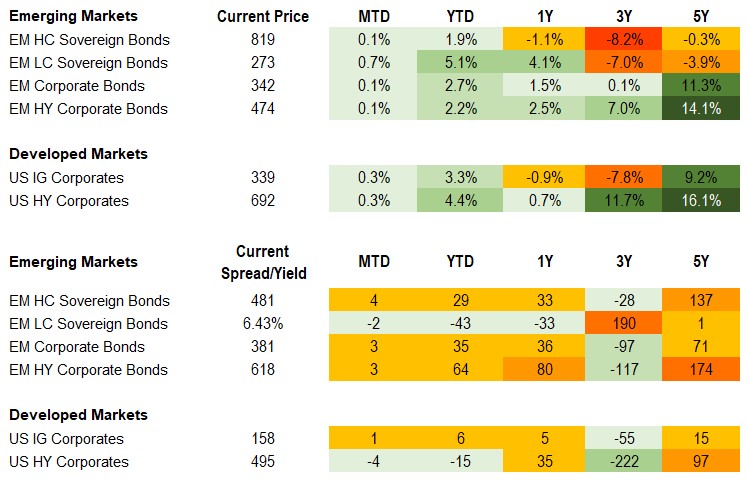
Equities
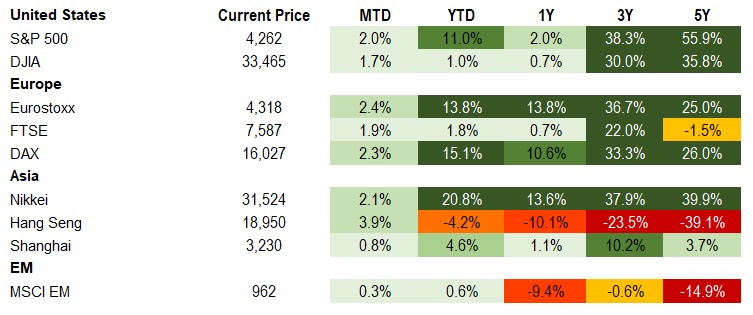
Commodities

Source for data tables: Bloomberg, JPMorgan, Gramercy. EM Fixed Income is represented by the following JPMorgan Indicies: EMBI Global, GBI-EM Global Diversified, CEMBI Broad Diversified and CEMBI Broad High Yield. DM Fixed Income is represented by the JPMorgan JULI Total Return Index and Domestic High Yield Index. Fixed Income, Equity and Commodity data is as of June 2, 2023 (mid-afternoon).
Emerging Markets Weekly Highlights
Despite overtures to market-friendly names, a full pivot to orthodox economic policy in Turkey is unlikely at the start of new Erdogan era
Event: As expected, President Recep Tayyip Erdogan won re-election for a new five-year term in the second round of Turkey’s Presidential Elections on May 28th. The incumbent defeated opposition candidate Kilicdaroglu with 52.2% vs. 47.8% of the votes in the runoff and vowed to appoint a new economic team with “international credibility”.
Gramercy commentary: We do not believe that in the wake of his convincing re-election, President Erdogan will be willing to authorize a compelling U-turn in economic policy management. In the days since Erdogan’s win, some Turkey-watchers have grown optimistic about the possibility that former Finance Minister and Deputy PM Mehmet Simsek, perceived as one of the most prominent market-friendly figures from prior Erdogan Administrations, could be handed a key economic policy role in the incoming cabinet. If it materializes, such an appointment would be a signal that some sort of policy normalization in Turkey’s tightly micro-managed economy might be forthcoming, but we are of the view that a sustainable and compelling pivot to economic orthodoxy is unlikely. Having retained the Presidency, Erdogan will now re-focus his attention on the next highly important political objective: wriggling back control of the Istanbul and Ankara municipalities from the opposition in local elections scheduled for March 2024. In that context, we think that maintaining high employment levels, robust domestic consumption and real wage growth will remain the dominant political priorities. This signals to us that a meaningful change to Turkey’s “high growth/low interest rate/high inflation” model is unlikely in the near-term. Given significant external liquidity pressures amid dwindling FX reserves and a large current account deficit that needs financing, President Erdogan’s ability to continue to muddle-through without edging closer to a “Balance of Payments” (BoP) scare will remain a function of his ability to continue to attract fresh financing from friendly governments in the region, namely the wealthiest members of the Gulf Cooperation Council (GCC) and Russia. Considering that the key GCC leaders were the first to congratulate Mr. Erdogan on his re-election, we are of the view that further financial support from the GCC is likely to materialize in the near-term, which, combined with an expected strong summer tourism season and lower global energy prices could provide some BoP relief in the near-term. However, regaining market credibility and a sustainable reduction in external vulnerabilities would require significant structural shifts in economic policy management, which we believe even a Simsek return as Turkey’s “economic tzar” is unlikely to deliver.
Divergence in China PMI data continues but composite remains expansionary
Event: May NBS Composite PMI dipped by 1.5pts to 52.9 with the manufacturing index falling deeper into contractionary territory at 48.8 while services held at steady 54.5. Conversely, Caixin Manufacturing PMI moved back into slightly expansionary territory with variations such as timing and a tilt towards private sector export-oriented companies in the Caixin survey likely contributing to differences with the NBS survey.
Gramercy commentary: The continued strength of services and softness in manufacturing has been an anticipated theme throughout the rebound in activity in the aftermath of reopening. While market consensus growth forecasts for 2023 remain at a solid 5.6%, some sell-side analysts have begun to marginally trim estimates. Absent policy adjustments, we think annual growth will hover around 4.5-5% as consumer momentum fades and the still sluggish property sector weighs on activity. With that being said, the financial work conference this summer could provide a platform for the beginning of a more holistic approach for property sector strategy and reform helping to improve prospects for 2H. At the same time, the opportunity for additional macroeconomic easing such as interest rate cuts could increase as we near the peak of the rate cycle in the U.S. and globally.
Angola fuel subsidy normalization gains momentum
Event: The Government announced that it will begin a long-awaited gradual adjustment on fuel subsidies beginning on June 2nd. The move is a partial step towards market pricing, specific to gasoline, and excluding segments of the population. This follows recent increased flexibility on the kwanza after months of stability. The Angola EMBIG spread has tightened just over 100bps since mid-May, despite overall oil price weakness.
Gramercy commentary: The progress on fuel price normalization combined with a return to FX flexibility in the context of lower oil prices is a welcomed credit development. While the country’s financial position remains highly dependent on oil prices and production, the recent actions reflect a commitment to the continuation of a largely orthodox policy management. It also leaves the country well positioned to re-tap the IMF to the extent necessary in a more pressured oil price environment.
Argentina continues efforts to manage FX shortages
Event: Minister of Economy, Sergio Massa and Congressman, Maximo Kirchner traveled to Beijing where they reportedly secured an extension of Argentina’s swap line with China by three years as well as doubled its readily available access under the existing line to $10bn. Meanwhile, the central bank put forward new regulations to restrict provincial access to dollars at the official rate and encourage use of the provinces’ own deposits. At the same time, negotiations with the IMF on the fifth review continue ahead of the next scheduled payment to the Fund at month-end.
Gramercy commentary: The authorities’ mixed approach to the pressured macroeconomic and FX situation continues to leave uncertainty elevated. Provinces vulnerable to the latest BCRA regulation include Chaco, Fuego, Chubut, Cordoba and Neuquén although BCRA officials did state that while the measures intend to push provinces to use their own dollar deposits, the government intends to provide them if the provinces do not have them. While we see tightening of FX access of provinces as supportive for relative value of sovereign over provincial bonds, it is a deepening of a heterodox approach which prolongs imbalances and could create legal and political pressures. Given that the timing of the IMF review this month coincides with the deadline for party alliances (14th) and candidate registration (24th), there is room for cross influence on the timing and nature of an IMF agreement and the ruling coalition’s ultimate candidate(s) selection and electoral strategy.
Emerging Markets Technicals
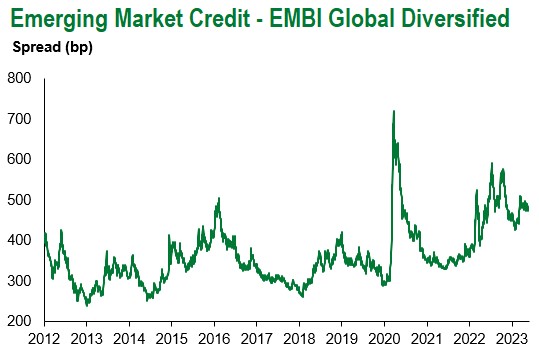
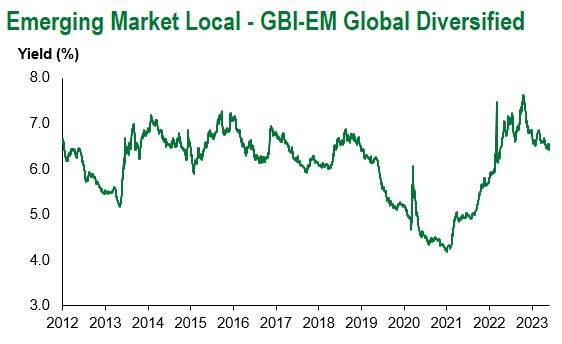
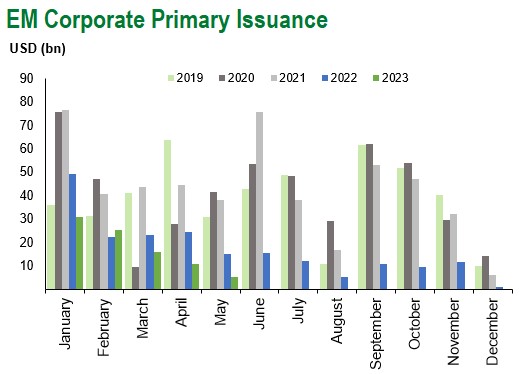
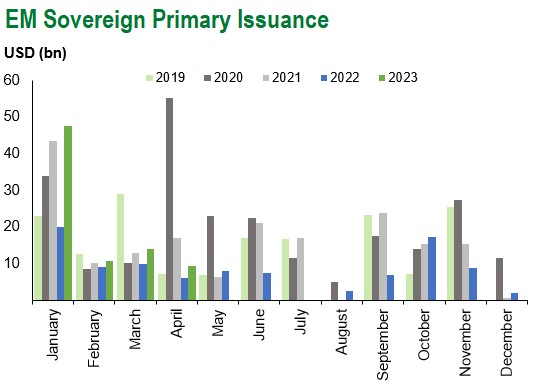
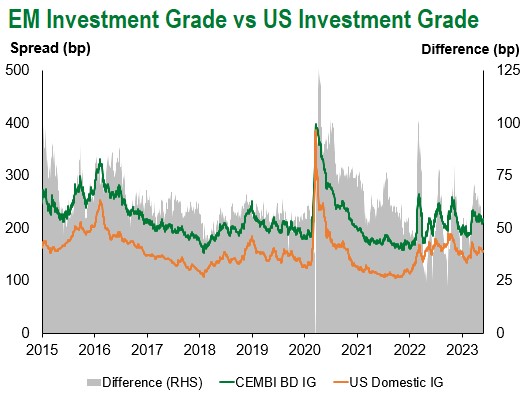
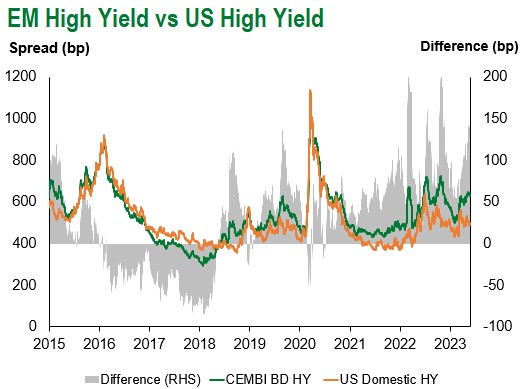
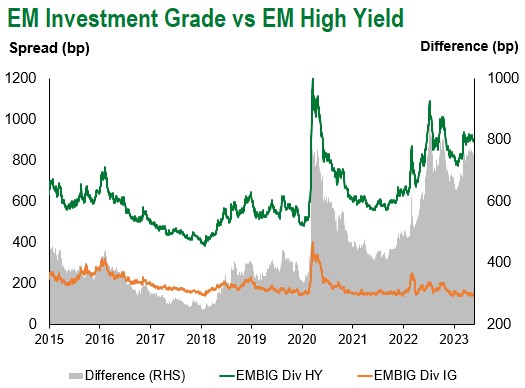
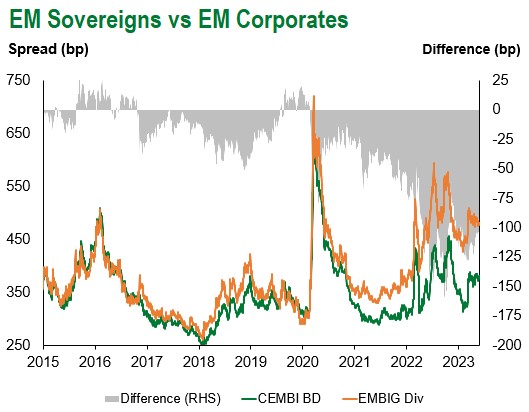
Emerging Markets Flows
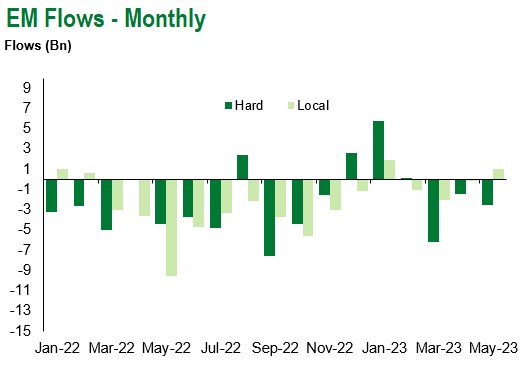
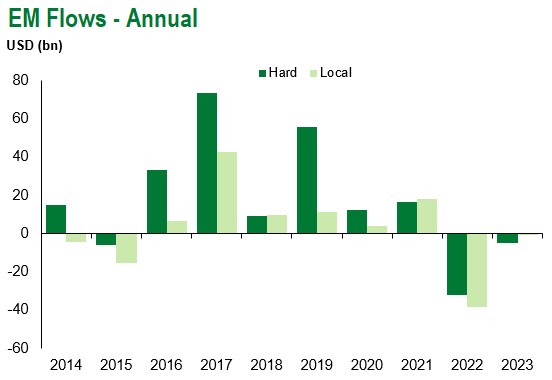
Source for graphs: Bloomberg, JPMorgan, Gramercy. As of June 2, 2023.
For questions, please contact:
Kathryn Exum, CFA ESG, Director, Co-Head of Sovereign Research, [email protected]
Petar Atanasov, Director, Co-Head of Sovereign Research, [email protected]
James Barry, Director, Deputy Portfolio Manager, [email protected]
This document is for informational purposes only. The information presented is not intended to be relied upon as a forecast, research or investment advice, and is not a recommendation, offer or solicitation to buy or sell any securities or to adopt any investment strategy. Gramercy may have current investment positions in the securities or sovereigns mentioned above. The information and opinions contained in this paper are as of the date of initial publication, derived from proprietary and nonproprietary sources deemed by Gramercy to be reliable, are not necessarily all-inclusive and are not guaranteed as to accuracy. This paper may contain “forward-looking” information that is not purely historical in nature. Such information may include, among other things, projections and forecasts. There is no guarantee that any forecasts made will come to pass. Reliance upon information in this paper is at the sole discretion of the reader. You should not rely on this presentation as the basis upon which to make an investment decision. Investment involves risk. There can be no assurance that investment objectives will be achieved. Investors must be prepared to bear the risk of a total loss of their investment. These risks are often heightened for investments in emerging/developing markets or smaller capital markets. International investing involves risks, including risks related to foreign currency, limited liquidity, less government regulation, and the possibility of substantial volatility due to adverse political, economic or other developments. References to any indices are for informational and general comparative purposes only. The performance data of various indices mentioned in this update are updated and released on a periodic basis before finalization. The performance data of various indices presented herein was current as of the date of the presentation. Please refer to data returns of the separate indices if you desire additional or updated information. Indices are unmanaged, and their performance results do not reflect the impact of fees, expenses, or taxes that may be incurred through an investment with Gramercy. Returns for indices assume dividend reinvestment. An investment cannot be made directly in an index. Accordingly, comparing results shown to those of such indices may be of limited use. The information provided herein is neither tax nor legal advice. Investors should speak to their tax professional for specific information regarding their tax situation.
